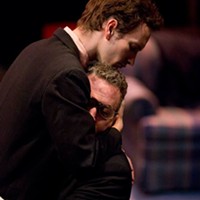As individuals and as a society, we almost universally admire and glorify the achievements of scientists, inventors, entrepreneurs and artists. Merely 25 years after his death, Romare Bearden Park was opened here in Charlotte in memory of America's greatest master of collage. Yet for all the lip service we give to the icons — the Einsteins, the Edisons, the Winfreys and the Michelangelos — we tend to be uneasy, suspicious, dismissive and even contemptuous of creative people when we actually meet them face-to-face.
True visionaries bump up against this truth day after day in adult life, but its root cause probably lies deep in the crevasses of childhood. Studies have shown that teachers, while professing to cherish creativity, overwhelmingly rate creative students as their least favorites. Why? Because these students are high maintenance. They're questioning, wise-alecky, unruly and different — the exact opposite of teachers' docile, compliant and conformist favorites. Renegades like me called them pets.
New and creative ideas disturb our settled idea of the universe, so it’s not surprising that studies have shown that fear and distrust of a creative idea increase when the elements of risk and uncertainty are infused into them. I was supposed to “outgrow” my tendency to think out-of-the-box, embrace certitude and practicality, model my behavior on how I saw the world working, put on a suit and tie, and keep my creative ideas to myself.
Sad to say, I’ve experienced relapses. Transplanting new ideas about freshman composition pedagogy that I’d learned at Western Washington University — like free writing and journal keeping — got me in a mess of trouble when I landed a teaching assistantship at University of South Carolina. Then decades later, I proposed my “home run” ad idea at Meineke Discount Mufflers.
I’d been a copywriter at a local ad agency when I arrived here in 1986, and for eight years, as corporate communications manager at the company HQ, I’d crafted Meineke’s image among dealers by writing the newsletter, the technical journal and the CEO’s annual State of the Company speeches. Toss in 10-15 years of credibility here at the Loaf.
So one day, while covering an executive meeting, I piped up and said that Meineke’s TV spots were bland, generic and forgettable. Reason? We were like the rest of the herd, tailoring our spots to meet the metrics, the research and the demographics which mean nothing if you fill the emerging template with pap. We’re thinking too timidly if we’re trying so hard to create an ad that people would remember.
We should aspire to a spot that people couldn’t forget. Let’s bring our dealers and/or our spokesperson, George Foreman, onscreen singing “We Are Meineke” to the tune of the Sister Sledge’s “We Are Family” — and embed our various ad messages in the second line of the song with each repeat. It didn’t require a genius songsmith to come up with rhyming lines, stressing “free” or “quality,” but I offered some decent examples.
My earworm idea didn’t get 40 seconds’ worth of consideration. Because I wasn’t the company’s ad agency, because my creative idea wasn’t supported by solid unimaginative data, and — perhaps most importantly — because the idea was euthanized before Meineke dealers might have had a say.
So with my heart still beating wildly, I returned to my desk and never offered another creative ad idea. Compared to how two of Charlotte’s most important theater visionaries were treated by their companies’ boards, I was lucky.
In the most embarrassing public ceremony I can remember, Steve Umberger was pushed out of Charlotte Repertory Theatre, the company he founded and brought to national prominence, by a clueless board of directors who proceeded to run the company into the ground in less than three years. When the board's reputation became so odious in 2005 that there was no hope of hiring a new artistic or managing director, Umberger and former managing director Keith Martin offered to come to the rescue.
Rather than swallowing their pride, Rep's board impaled themselves on it, closing down Umberger's company without ever sending out a distress signal to the community, claiming instead that Charlotte wouldn't support professional theater.
Over the past month, history repeated itself at Carolina Actors Studio Theatre. Two days after CAST sent out a press release on June 4 boasting that "We've already raised $25,100!" toward their $75,000 fundraising campaign, CAST's board sent out its own obituary, closing down the company on June 30 — in the process, showing founding artistic director Michael Simmons the door.
Again, the shutdown occurred without an SOS to the community, within three years of a new board taking over. "It's not a matter of we're drowning under debt," board spokesperson Lisa Walker said in a WFAE report. "It's a matter of we don't have enough income year over year to manage to sustain."
It gets worse. After being rather moribund about launching campaigns to keep the theater afloat — that's the view expressed to me by two former board members and CAST's former executive director — the board launched a campaign to assure CAST of a decent burial! This ceremony, following the final performance of Gruesome Playground Injuries on June 21, was to actually mimic a funeral, Simmons told me, with the CAST lobby decked out like a funeral parlor.
Then it really got ugly. Simmons wouldn't attend the gruesome celebration and was barred from setting foot in the theater he himself founded 22 years ago. To retrieve his own memorabilia, Simmons had to be escorted onto the premises at 2424 N. Davidson St. by two board members. Doors had been locked and chained (they were still tied with rope from the inside when I checked on Sunday) to prevent Simmons from entering. His equipment is being liquidated by the board.
Local companies like On Q or Queen City or hundreds of others around the USA facing problems akin to CAST's aren't folding their tents without a fight — because they passionately believe in what they're doing, grasp the enhanced quality of life they're bringing to their communities, and aren't handcuffed by beancounting boards that don't share the passion or belief of their visionary founders.
No board in Charlotte would ever dream of treating Christopher Warren-Green, James Meena or Jean-Pierre Bonnefoux as shabbily as Umberger and Simmons have been treated. Charlotte Symphony, Opera Carolina and Charlotte Dance perform in our arts palaces and are too big to fail, part of our settled idea of the universe.
It's tougher for local theater companies. If you're small, you're marginalized and despised. Grow big and you're likely to be gobbled up by a big bad board that professes to cherish creativity but really distrusts it — enough to lock you out of your own theater.


